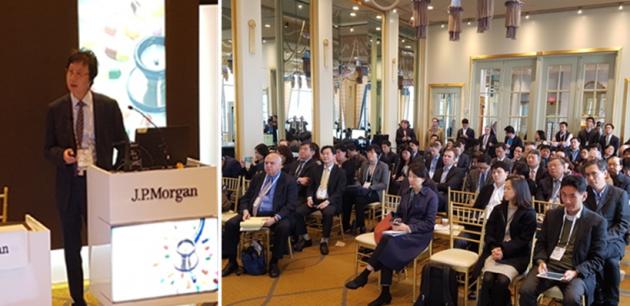Hanmi Pharmaceutical is ramping up efforts to enter the global market with its investigational nonalcoholic steatohepatitis (NASH) drug, LAPSTriple Agonist, the company’s CEO said at the JP Morgan Healthcare Conference Wednesday.
The company will begin a U.S.-based phase 1 trial for the NASH drug in the first half of this year, as the first of four clinical trials to be launched this year, Hanmi Pharmaceutical CEO Kwon Se-chang said.
Kwon presented the company’s vision and R&D strategy at the annual four-day conference held in San Francisco, California, one of the world’s most prestigious yearly healthcare forums.

"We are delighted to introduce Hanmi Pharm's future vision at the gathering of the world's top biopharmaceutical companies,” Kwon said. "We will do our utmost to make Korea a pharmaceutical powerhouse by developing innovative new drugs with Hanmi’s innovation."
The Korean pharma operates a pipeline comprised of 25 new drugs that include seven bio-drugs for obesity and diabetes, 12 immunotherapies, one immune-disorder medicine, and three medications for rare diseases.
The LAPSTriple Agonist phase 1 trial will aim to prove the safety and efficacy of the once-weekly, first-in-class biologic drug in treating NASH and obesity. The drug previously demonstrated potent synergistic effects of GLP-1, GIP, and Glucagon in animal studies, according to the company.
Since no medications for NASH exist, the possible commercialization of LAPSTriple Agonist will significantly improve the quality of life of patients, Kwon said. NASH, grouped under fatty liver disease, is liver inflammation and damage caused by a buildup of fat in the liver.
The Hanmi CEO also introduced three new innovative bio-drugs being developed in the field of rare diseases such as congenital hyperinsulinemia, mucopolysaccharidosis and short-bowel syndrome.
A phase 1 trial for its congenital hyperinsulinemia drug, LAPGCG Analog, will begin in the first half of the year, followed by a study for its short-bowel syndrome therapy, LAPSGLP-2 Analog.
Hanmi will also launch a global phase 1 trial for its LAPSCOVERY-based obesity and diabetes drug developed jointly with Sanofi, LAPSInsulin Combo, Kwon said.
The company is also making strides in the immunotherapy sphere with its first-in-class lung cancer therapy Pozionitib, Kwon said.
Pozionitib proved “breakthrough” efficacy in non-small cell lung cancer patients with an Exon-20 cell mutation, the company said. In an animal study led by MD Anderson Cancer Center, Pozioninib proved to be 40 times more potent and 80 percent more effective in reducing tumor size compared to existing therapies.
“Poziotinib will drive innovation in the area of [non-small cell lung cancer] as no drugs for treating lung cancer patients with an Exon-20 mutation have been developed yet,” Kwon said.
Hanmi is also developing an FLT3 inhibitor (HM43239), a next-generation target checkpoint inhibitor, to treat acute myelogenous leukemia (AML). HM43239 proved in preclinical trials to inhibit all mutations effectively while also inhibiting leukemia stem cells (LSCs), a significant cause of recurrence in the cancer patient.
Although AML has the highest incidence of leukemia, it has low responsiveness to existing therapies and has a high refractory rate. Around 30 percent of AML patients exhibit an FLT3 mutation, according to Hanmi.

